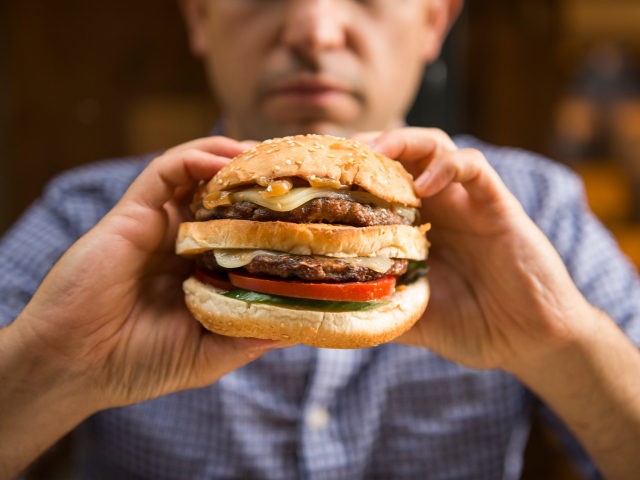Britons should eat one-third less meat, and salt and sugar must be taxed, according to a review commissioned by the government, which also recommends subsidies from the taxpayer to promote the development of “alternative proteins”, which could include lab-grown meat.
The National Food Strategy also recommended that fruits and vegetables be prescribed like a medication by the National Health Service (NHS) for low-income households with perceived poor diets.
The government’s Climate Change Committee has said that Britons must reduce the amount of meat eaten by 20 to 50 per cent by 2050 to become ‘net zero’, which prompted the report’s authors to set the drastic goal of people cutting meat in their diets by 30 per cent “over ten years”.
There have been rising calls for a meat tax to save the planet in recent years, including from the Green Party’s sole MP, while one British barrister claimed that eating meat was “ecocide” and should be made illegal.
Britons, however, are highly resistant to the suggestion, with a 2019 poll finding the majority would not give up meat because of warnings about global warming. While a poll from this year conducted for No Meat May found that two-thirds of British men said they would rather die five to ten years early than give up meat, and more than one-in-twenty men would rather go to prison than stop eating meat.
The NFS appeared aware of public sentiment, shying away from the possibility of a “meat tax” and after admitting that such a levy would hit poorer families harder.
But the National Food Strategy did recommend the state intervene on salt and sugar amounts in food in the form of taxation, proposing a £3 per kilogram levy on sugar and a £6 per kilogram tax on salt “sold for use in processed foods or in restaurants and catering businesses”. The measures would come in by the end of the decade and could add seven and a half pence onto the price of an average single-serving chocolate bar.
“This would create an incentive for manufacturers to reduce the levels of sugar and salt in their products, by reformulating their recipes or reducing their portion sizes,” the review said.
Some members of the food industry remain unconvinced that the Nanny State measures would work, with cafe owner Andrew Burton telling Sky News that while he had tried to reduce the sugar and salt content in his food, “there’s only so far you can go before someone says ‘That’s bland, can we have the salt, can we have the sugar’, and they just put it on themselves”.
For foods where the recipe could not be reformulated to reduce the amount of sugar or salt, the National Food Strategy said that “the increased cost might be passed on to the consumer”.
“This would make such products less appealing,” the group said, essentially admitting that for poorer people, they would simply be priced out of being able to afford food deemed unhealthy.
Findings by the taxpayer advocacy group the TaxPayers’ Alliance (TPA), the neoliberal think tank the Adam Smith Institute (ASI), and the Institute for Economic Affairs (IEA) have said that if Big Government starts taxing salt and sugar, it could cost every household an extra £172 a year in groceries while saving each person the number of calories in just half a digestive biscuit.
One Conservative MP also criticised the notion, with Dehenna Davison saying: “We shouldn’t be taxing people for ordering a pizza on a Friday night rather than having a salad.”
The review, commissioned by the Conservative government in 2019, also advised that some £50 million in taxpayers’ money be spent “to help build, fund and support an innovation cluster where scientists and entrepreneurs can develop, test and scale up new alternative proteins”, later raising the possibility of people eating “lab-grown meat”, saying it “might yet turn out to be the tastiest alternative to farmed meat, so we shouldn’t write it off”.
It then recommended a trial of a “Community Eatwell” programme, where the NHS doctors could “prescribe fruit and vegetables – along with food-related education and social support – to patients suffering the effects of poor diet or food insecurity”.
Like much of Britain’s establishment organisations in the grip of climate anxiety, the report raised the issue of global warming, claiming that the food we eat “is doing terrible damage to our planet and to our health”. The report further stated that not only was the global food system “the second-biggest contributor to climate change, after the energy industry”, but that “our eating habits are destroying the environment”.
One of the solutions posed was that the UK reduces its own capacity to produce food by converting around 20 per cent of English farmland to natural habitats and be used for “carbon storage”.
Reacting to the release of his food tzar’s report on Thursday, Prime Minister Boris Johnson said that while he will “study the report”, he added: “I am not I must say attracted to the idea of extra taxes on hard-working people, let me just signal that.”

COMMENTS
Please let us know if you're having issues with commenting.